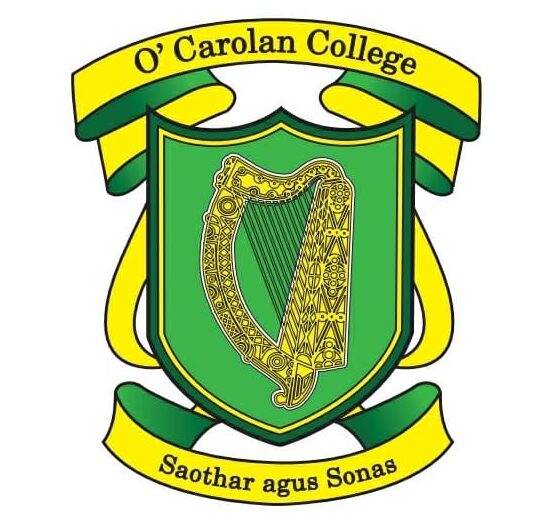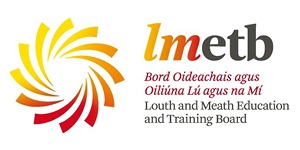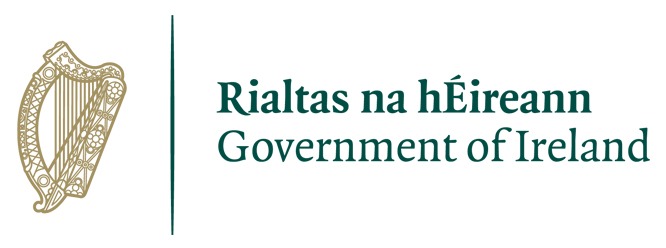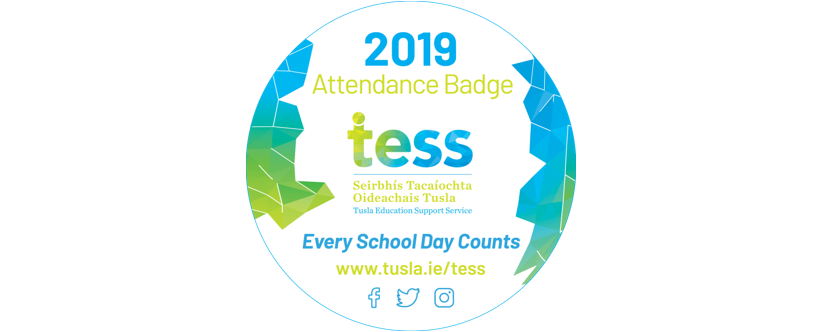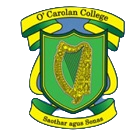Science
Department members:
Daryl Caplice, Clodagh Monaghan, Carol Nugent, Mary Tighe, Alana Carolan, Nicola McConnell, Sarah Meade, Megan Brady.
Department Co-ordinator:
Daryl Caplice
Provision of subjects in school:
The Science Department is based in three laboratories, as well as utilising various classrooms in the school. There is one laboratory inside the main building and two outside. All labs are equipped for Junior Cycle Science, in addition there is a designated specialised lab for Senior Cycle Chemistry, Biology, Agricultural Science and Physics.
Junior Science:
Junior Cycle Science is a compulsory core subject for all pupils. The new specification for Junior Cycle Science focuses on the development of students’ knowledge of and about, science through the unifying strand, Nature of science. There are four contextual strands in which students learn about the living world and beyond: Physical world, Chemical world, Biological world, and Earth and Space. It has been designed for a minimum of 200 hours of timetabled student engagement across the three years of junior cycle. Students will undertake two Classroom-Based Assessments that will involve the students designing their own investigations and research projects. Students will also complete an Assessment Task worth 10% of their final grade before taking a two-hour common level written examination at the end of third year. JCSP Science is on offer for students needing additional help with Junior Science.
Junior Cycle Ecology Trip
This year our Third Year Science students completed their Ecology field experiments at the Education and Learning Centre in Dublin Zoo. The students enjoyed a fantastic day out in Dublin Zoo that started with some free time to explore the Zoo before conducting an ecological survey in the adjacent Phoenix Park. The students learned how to conduct quantitative and qualitative surveys of a grassland as well as how to capture and identify a range of insect species. This was extremely beneficial to their learning as ecology questions are almost guaranteed to appear on the state exams.
Science Week
For science week this year the science teachers all prepared fun and engaging activities for their students including Science Quizzes, CSI Workshops, Chemistry & Physics demonstrations, STEAM careers research, a farm talk and much more besides. There was a Cell model competition for all First Years and we had many fantastic entries. Congratulations to this year’s winner Olivia Sheridan who created a magnificent 3D model of The Cell and was the proud winner of a Fit-Bit smartwatch. Congratulations also to the two winners of the “Science Eyes” photo competition which also ran all week. Danny Farrell in 2nd year and Cairah Beckham in 5th year were joint winners with photographs of light refraction and genetic heritability in horses respectively.
Transition Year Science covers many disciplines of Science. The students are introduced to Leaving Certificate Physics, Chemistry and Biology. They also take modules in Forensic Science –CSI and The Nature of Science. Through a variety of modules, experiments and projects, the students are given a taste of Senior Cycle science and their interest in a broad range of science disciplines is encouraged.
TY Agricultural Science students this year focused on Dairy Production and in particular ‘Care of the cow at calving with safety in mind, calf rearing, farm safety, slurry, and sustainability and the environment.
Three students who entered the Agri aware ‘Environmental innovators’ competition were selected as finalists out of 110 entries Nationwide. This was a great achievement for our students Callum Byrne, Tyler Matthews and Evan Curley. They attended the final at the Bord Bia hub in Ballsbridge and show cased their project ‘Reuse to Regrow – Let sustainability meet Biodiversity’. The Transition Year students alos produced some key posters on Climate change which led to a real debate on what Climate changes means and the consequences of it. Thye also completed the Farm safety with slurry course for which they received a certificate from the HSA.
TY Biology and Science modules focused on the cross curricular theme of health and wellbeing by examining aspects of cardiovascular health and looking at food choices in terms of calories and macro-nutrient content. Some of the activities the students got to perform included a heart dissection, measuring of their exercise pulse rate and anaerobic capacity and devising diets for different people based on their gender, age and lifestyle. Students learned how to read food labels, monitor their pulse rate and what effect different lifestyle choices can have on the heart and circulatory system.
As part of their TY Science module students also had the opportunity to carry out a DNA Profiling (Gel Electrophoresis) activity. This was thanks to Amgen Biotec Experience Ireland from whom Mr Caplice borrowed the electrophoresis kits, having completed the required training. Students got to practice micro-pipetting and sterile technique skills and learned how to compare DNA profiles from various samples.
The TY Physics module comprised of students learning Astro-Physics, in which traditional physics topics such as light, sound, waves, radiation and nuclear physics were taught with an astronomy context. Students learned how to make their own long exposure camera’s using undeveloped photographic paper and shoeboxes. They also used the John Hopkins University Remote Telescope to take data. This data was used to process images of the Dumbbell and Crab Nebulae.
The TY Chemistry module provided an introduction to the fundamentals of chemistry by building on previous knowledge from Junior Cycle Science. Students learned about atomic structure, history of the atom, bonding, chemical formula, equations and an introduction to the mole and its calculations. Students then carried out a variety of experiments to visualise the concepts being taught. This included flame tests (a Leaving Certificate mandatory experiment), the formation of ionic compounds, metal and acid reactions and crystal making from the reaction of copper oxide and sulfuric acid.
Senior Cycle:
This year, 80% of students are studying a science subject for their Leaving Certificate. The subjects on offer are Biology, Physics, Chemistry, Agricultural Science and Computer Science.
Students can pick up to three of these subjects at senior cycle.
All senior science classes are timetabled for five periods per week including at least one double in a lab for practical activities. All classes are mixed ability and Higher and Ordinary levels are offered. Assessment is by means of a terminal examination paper and coursework.
Planning and preparation:
Books included-
Essential Science by Declan Kennedy and Rose Lawlor
Leaving Certificate Biology Plus by Michael O Callaghan
Chemistry Live by Declan Kennedy
Real World Physics by Dan O’ Regan
Breaking Ground 3rd edition by Edco for Leaving Certificate Agricultural science
Department Meetings:
There were several department meetings during the year. The main science department meetings are held in September, December and at the end of the school year. These meetings are held to discuss department issues such as state examination results, junior cycle teaching methodologies, ordering equipment and chemicals, open night, annual report preparation and the budget for the next academic year.
Assessment:
Assessment at Junior Cycle is based on project work, posters, presentations, chapter tests, Christmas exams and Summer exams. This allows for greater communication between all science teachers and enables us to identify students with potential for senior science subjects as well as identifying students who may require extra help. The Junior Cycle Science course also incorporates classroom-based assessments; an Extended Experimental Investigation in Second Year and a Science in Society Investigation in Third Year.
Teaching and Learning:
In the science department, we employ a variety of teaching methodologies such as theoretical instruction, experimental techniques and investigations, discovery learning, conceptual understanding and inquiry-based learning activities. This variety in teaching methodologies allows the department to offer a wide range of content in many ways to engage our students and educate across the spectrum of Gardner’s styles of learning.
Awards and grants:
Dr. Dan Ryan Award for Science.
The goal of this award is to promote science in society and over the years has been awarded to students from the various science disciplines. Congratulations to the 2023/24 winner – Orla O’Malley.
The Naughton Scholarship.
Each year, 36 students are awarded Naughton Scholarships nationally. There is at least one winner from each County in the Republic of Ireland. The scholarship is intended as a reward and encouragement to exceptional students who would like to study in the STEM field (science, technology, engineering and maths) at University. OCC Alumni Jamie Reilly, Ciaran Corrigan and Sadhbh Leahy have all been recipients of this marvellous scholarship. We are very proud of all these students and we are delighted to see their incredible efforts recognised by national bodies.
The school of each winning student also receives prize money which can be used to purchase equipment for the science labs.
Open Night:
Another successful open night for the OCC Science Department this year. Both the Chemistry and Biology/Ag Science labs were bursting at the seams all evening with prospective students wanting to catch a glimpse of demonstrations such as the heart dissection, red cabbage acid indicator and the methane bubble. A huge thanks to all the students who helped make it such a success on the night including Ciara Burns, Brandon Scanlon, Maddie Goodwin, Ethan Matthews, Luke Vasselin, Kayah Cassidy, Shannon Ruby Russell. We also had some students in showcasing their Classroom based (CBA) experiments Matthew Tiernan Reilly, Evie Price, Kellie Ann Owens and thank you to Jack Finegan who also helped out on the night by collecting thumb prints on agar plates to highlight the importance of hand washing.
Senior Science
Agricultural Science is the study of the science and technology underlying the principles and practices of agriculture. It aims to develop knowledge, skills and attitudes regarding the factors that affect the long-term well-being of agricultural resources, and places emphasis on the managed use of these resources.
Agricultural science is suited to pupils from a farming background or those who have a great interest in farming and environmental issues and wish to develop their knowledge further. It also suits pupils who wish to undertake a science subject which may be a requirement for their future third level studies. You do not need to live on a farm to study Agricultural science.
The new Agricultural Science curriculum began in September 2019.
The curriculum is divided into four main strands with eight cross cutting themes throughout each of these strands.
Strand 1 – Scientific practices – the scientific method
Strand 2 – Soils, – Soil air, soil water, soil Cation exchange, soil PH, Soil management etc.
Strand 3 – Crops, – energy crops, food crops, grassland, grass conservation, advancements in plant genetics
Strand 4 – Animals – Dairy, beef, sheep, pig production, Advancements in animal genetics, environmental issues, sustainability etc.
This year’s current Sixth years are currently working through their ‘Individual Investigative Study’ and the theme this year for their brief is ‘The role of food production in maintaining natural resources in Irish Agriculture’. This replaces the practical exam which used to take place in May of the final year. This component is worth 25% of the Leaving certificate Agricultural Science exam so is a massive boost to the students before they undertake the written exam. This is the only senior science subject where pupils can gain these marks before sitting the exam.
The current fifth years will now undertake a similar type of study but with a different theme. The theme for 2024 is ‘A change in agricultural practice and/or an advancement in technology ‘
Trips:
This year our agricultural science students were lucky to visit a local Farm which is milking 420 cows on a Robotic milking enterprise of Spring and Autmn calving grass- based system. Here the students experienced how robotic milking occurs and how it can work off a grass-based enterprise. We also attended the Ballyhaise open day this year on March 15th. Students gained key experience on Suckler Beef, sheep and bull Beef production. They also visited the machinery shed and got an insight into the new technology used in agriculture – GPS, autosteer. The key farm safety features in each of the sheds that allows for the safety of the animals and the person handling the animals were also observed. The farm finishes their bulls under 16 months and students could see the differences between entire males and castrated animals.
How is it assessed?
There are also twenty specified practical activities within each of the four strand which pupils carry out and report on. These experiments will also appear on the paper.
Careers
There are a broad range of careers in Agriculture ranging from Veterinary Surgeon, Agricultural adviser, Environmentalist, Horticulturist, Botany, Crop adviser, Teaching, Animal breeder, AI technician, Journalism, Agribusiness and sales and Forestry to name but a few. Many of our past pupils are now flourishing in their chosen career in the agricultural field and we wish them the best of luck.
Biology
Biology is the study of life. This includes the exploration of the diversity of life and the inter-relationship between organisms and their environment. Students will develop an understanding and knowledge of the unit of life – the cell – whose structures and processes are shared by all living organisms and, in so doing, gain an insight into the uniqueness, function and role of organisms, including themselves.
Students also learn how other living organisms and their products are used to enhance human health and the human environment and make informed evaluations about contemporary biological issues. It is intended that the biology syllabus will prove relevant to the lives of students and inspire in them an interest in and excitement about biology.
The syllabus is split into Unit 1 (Study of Life) Unit 2 (The Cell) and Unit 3 (The Organism). Students study the theory relating to these topics as well as carrying out 20 mandatory experiments over the two-year cycle. All marks are awarded for the final exam in June with 15% of marks relating to students’ knowledge of the experiments conducted.
Studying Biology is essential for students wishing to pursue careers in the following areas; Medicine, Physiotherapist, Veterinary Studies, Food Science, Horticulturist, Immunology, Marine Biology, Nutrition, Pathology, Pharmacology, Physiology, Science Education and Forensic Science.
Amgen Biotec Experience (5th Years)
Like the TY’s, 5th year Biology students had the opportunity to perform gel electrophoresis (DNA Profiling) using kits borrowed from Amgen Biotec Experience Irelan. While not a mandatory experiment on the Leaving Cert course, this hands-on experience really enhanced the learning for students and will be helpful if DNA profiling questions are present in Section C of next year’s paper. Having completed Labs 1 and 2 of this series of activities, two students (Hollie Keogan & Cairah Beckham) were selected attend an advanced workshop on genetic engineering of bacterial cell in The Conway Institute UCD. The girls had a fantastic day out and with both considering a future in Science/Medicine, they gained valuable experience of life in third level education.
Ecology Field Trip (6th Years)
This year our Leaving Cert Biology students got the opportunity to complete their Ecology practical in Dublin Zoo. The students enjoyed a fantastic day out that started with some free time to explore the Zoo before conducting an ecological survey in the adjacent Pheonix Park. The students learned how to conduct quantitative and qualitative surveys of a grassland habitat as well as how to capture and identify a range of insect species. They also studied a range of adaptations that both plant and animal species use to survive and compete in their habitats. This was of extreme benefit to their learning as the Leaving Cert exam often comprises up to 20% of questions based on Ecology.
Chemistry
Chemistry is the branch of science concerned with the structure and composition of the substances which make up the world around us. Chemistry is a key subject required for many Third Level courses and careers such as Medicine, Dentistry, Pharmacy, Food Science, Ag Science, Sport Science and Engineering. Topics studied include Organic Chemistry, Atomic structure, History of the Atom, The Mole concept, The Periodic table, Chemical bonding, Rates of reactions, The Gas laws and Volumetric analysis.
The aims of the syllabus are:
- To stimulate and sustain students’ interest in, and enjoyment of, chemistry
- To provide a relevant course for those students who will complete their study of chemistry at this level
- To provide a foundation course in chemistry for those students who will continue their studies in chemistry or in related subjects
- To encourage an appreciation of the scientific, social, economic, environmental and technological aspects of chemistry and an understanding of the historical development of chemistry
- To illustrate generally how humanity has benefited from the study and practice of chemistry
- To develop an appreciation of scientific method and rational thought
- To develop skills in laboratory procedures and techniques, carried out with due regard for safety, together with the ability to assess the uses and limitations of these procedures
- To develop skills of observation, analysis, evaluation, communication and problem solving.
In general, all students follow the higher level syllabus in fifth year. In sixth year, a small number of students may wish to take ordinary level. Homework and tests are differentiated to facilitate these students.
RSC Schools’ Analyst Competition
Miss McConnell has successfully registered OCC with “Teach Chemistry” with the Royal Society of Chemistry (RSC). Teach Chemistry provides support including events and resources for teachers in secondary schools, colleges and teacher training institutions in the UK and Ireland. As part of this, Miss McConnell registered OCC for the Schools’ Analyst Competition 2024 and is delighted that OCC has been selected to participate in the competition. 5th Year students will compete in April in teams of up to three students against each other and teams from 400 schools across Ireland and the UK in a series of analytical challenges. These challenges will offer students the chance to apply their chemistry knowledge in a fun and rewarding way to solve the challenges and answer tough questions. The winning team from each school will receive a certificate to recognise their achievement but will also be entered into a second round against the other winning teams in the region for the chance to be crowned champions! Regional winners will also receive a prize to acknowledge their achievement. Best of luck to our 5th Year chemists!
Physics
Physics is the study of matter, energy, and the interaction between them. Physics aims to describe the behaviour of everything in the physical universe. Topics covered in physics include Optics, Thermodynamics, Vectors and Mechanics, Sound, Waves, Electromagnetism, Quantum and Nuclear Physics. The main depth of learning is in both mechanics and electricity. Both these topics make up the majority of the course and are essential to understanding most physics-based fields in todays’ economy. Each topic is balanced with a combination of experimentation, problem-based learning, demonstrations, mathematical manipulation when applicable and review of theory.
All students get the opportunity to study Physics in transition year and have the option to choose the subject as part of their Leaving Certificate studies. Students who choose Physics are curious about how things work, have a strong head for numbers and enjoyed studying the Physical world at Junior Cycle in Science. As a subject, Physics gives students a good problem-solving ability. These skills are essential for careers such as, but not limited to, Optometry, Lab Research, Radiography, Engineering, Geology, Astronomy, Media and Video production, IT and Communications, Biomechanical Engineering, Games developer and many others.
In general, all students follow the higher-level syllabus in fifth year. In sixth year, a small number of students may wish to take ordinary level. Homework and tests are differentiated to facilitate these students. It should be noted that students wishing to take this subject would be advised to have a good understanding of Junior Cycle Mathematics as well as Junior Cycle Science.
